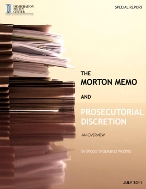Released on Mon, Jul 25, 2011
Washington D.C. - Tomorrow, Tuesday, July 26, the House Judiciary Subcommittee on Immigration Policy and Enforcement will hold a hearing on the “Hinder the Administration’s Legalization Temptation Act” (HALT Act), a bill that would suspend discretionary forms of immigration relief until January 21, 2013—the day after the next Presidential inauguration.
Today, the Immigration Policy Center held a briefing to describe how the HALT Act systematically attacks many of the discretionary forms of relief available to immigrants. Immigration policy experts described the implications of limiting the Administration’s discretion in prosecuting immigration cases, as well as the impetus behind the bill.
Mary Giovagnoli, Director of the Immigration Policy Center, said:
“The HALT Act seeks to disable or suspend a number of immigration provisions that provide any discretionary relief to immigrants in order to chastise the Administration for a series of policy memos that contemplate using executive branch authority to improve current laws. Its authors seek to discourage the Administration from interpreting the law in ways that are more streamlined or benefit more individuals.”
Beth Werlin, Deputy Director of the Legal Action Center, further explained:
“By taking away the power to grant deferred action, the HALT Act is basically interfering with the Administration’s ability to prioritize its removal cases and focus its resources on serious criminals and those who pose a true security risk.”
Marshall Fitz, Director of Immigration Policy at the Center for American Progress, commented on the impetus behind the bill:Read more...
View Release



